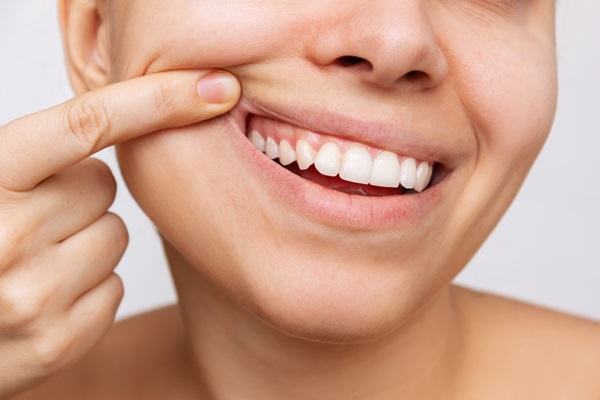How Does One Get Gum Disease?

Most people know about cavities, but what about gum disease? Both of these issues can affect your oral health, but people often overlook gum problems. There are varying levels of severity when it comes to this condition. Even minor bouts with it can cause pain and discomfort. If you do not treat it, you could suffer severe health effects. You should know how to identify the symptoms of this disease and what leads to it.
Clues that a person has gum disease
Like tooth decay, gum conditions can start out small. Over time, however, it is usually clear that there are oral health concerns. Diseased gums will usually bleed during brushing. Sometimes, the gums may bleed more frequently. The gums may also become inflamed and be tender to the touch. These are signs that the person has gingivitis, a milder form of the disease.
At more serious stages, periodontitis occurs. Symptoms may include receding gums and infections in the mouth. The infection can spread from there throughout the body. Cardiovascular problems can link to gum disease.
Not enough brushing
Occasional brushing (or never brushing at all) will likely lead to gum disease. Brushing with a soft-bristled brush and fluoride-based toothpaste removes food particles from the teeth and at the gumline. Doing this will prevent bacteria from building up and causing plaque and tartar. Brushing should occur at least twice a day. Inattention to these details will increase the individual’s chances of developing gingivitis and subsequently periodontitis.
Poor flossing habits
Flossing is just as important in the fight against gum disease. Flossing can dislodge particles of food from places that brushing may miss, such as in between hard-to-reach teeth. People of all ages should floss daily, preferably after eating or at the end of the day. Ignoring this habit will cause gums to swell and become tender. Bacteria will form and start to pull the gums away from the teeth.
Avoiding the dentist
Going to the dentist’s office may not be the most exciting thing, but it is vital. A semiannual dental checkup allows the dentist to clean the patient’s teeth and examine the individual for emerging problems. A patient may not recognize gum disease, but a dentist can spot this concern and start a treatment plan. People who rarely, if ever, go to the dentist may never get the professional care they need to combat this issue. Someone with gum problems may need to visit the dentist more often, as much as every two months.
Do your part to stay healthy
You do not want to contend with the effects of gum disease. The consequences could be severe for your oral health and oral wellness. Poor oral hygiene is a major culprit of this condition. If you stay on top of brushing and flossing, and if you visit the dentist, you can maintain healthy gums. Talk to your dentist today if you have concerns about how your gums look and feel.
Request an appointment here: https://winnetkaplazadental.com or call Winnetka Plaza Dental at (818) 772-6222 for an appointment in our Winnetka office.
Check out what others are saying about our dental services on Yelp: Gum Disease in Winnetka, CA.
Related Posts
Gum disease is a common oral health issue that dentists treat. You may focus more on cavity prevention, but gum issues can be just as critical to your wellness. Putting off treatment can cause more serious issues. You should first recognize the signs and symptoms of this condition and then seek your dentist’s help right…
Learning more about your options for getting new dentures is necessary, as you need to make a choice that works for you. This requires thinking about your current lifestyle and how denture care will fit in. Denture care is very important, as when you take proper care of your dentures, they can last many years.Finding…
When it comes to health and wellness, prevention plays an integral role. In addition to making healthy lifestyle choices, practicing routine dental care is a vital step in maintaining a healthy mouth and body. There are numerous benefits for patients who commit to proper home and professional dental care.Routine dental care is necessary to maintain…
Good self-care habits ought to include time for routine dental care. From spending a few minutes each day on oral hygiene to visiting a general dentist throughout the year, taking care of the teeth and gums is an important part of personal health. Rather than leaving oral health to chance, implementing preventative dental care practices…
